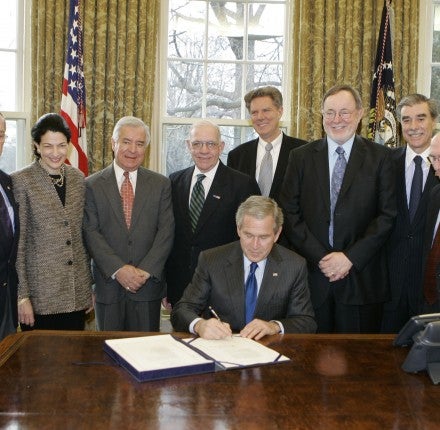
President George W. Bush signs the Magnuson-Stevens Fishery Conservation and Management Reauthorization Act of 2006, joined by a bi-partisan group of lawmakers.
Photo Credit: AP, from talkingfish.org
Fisheries management can be a contentious business. So it’s all the more striking that the business of legislating on federal fisheries has historically been a relatively cordial affair. The gains of the last two decades have been possible because of strong cooperation across the aisle. In 1996 the Sustainable Fisheries Act (SFA) prioritized conservation in federal fisheries management for the first time. Alaska’s Republican Congressman Don Young jokes that the Magnuson-Stevens Act could have been called the Young-Studds Act because of his close collaboration on the SFA with Gerry Studds, then a Democrat from Massachusetts. It passed both chambers by overwhelming margins and was signed into law by President Clinton. Ten years later, the Magnuson-Stevens Reauthorization Act strengthened conservation mandates in response to continued overfishing and the failure to rebuild overfished species. It was championed in the Senate by Republican Ted Stevens in close cooperation with his Democratic counterpart Daniel Inouye. It cleared the Senate by unanimous consent, and was signed into law by President George W. Bush.
With Congress once again considering reauthorization of the Magnuson-Stevens Fishery Conservation and Management Act (MSA), there’s a welcome bipartisan consensus that the law is working. Senior lawmakers on both sides of the aisle are talking about building on our recent successes and exploring minor tweaks to the law rather than pursuing any kind of far-reaching rewrite. Despite serious ongoing challenges in specific fisheries, the legal framework created by Congress is clearly succeeding. Science-based annual catch limits are ending overfishing; and statutory rebuilding timelines have driven the recovery of more than 30 previously depleted stocks. This is great news for the health of the ocean. It’s even better news for seafood lovers, saltwater anglers, and coastal small businesses—the most important long-term beneficiaries of fishery management success. Read More










